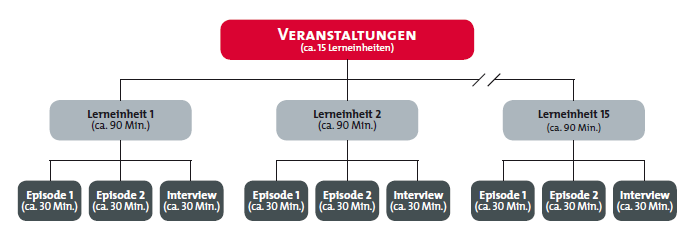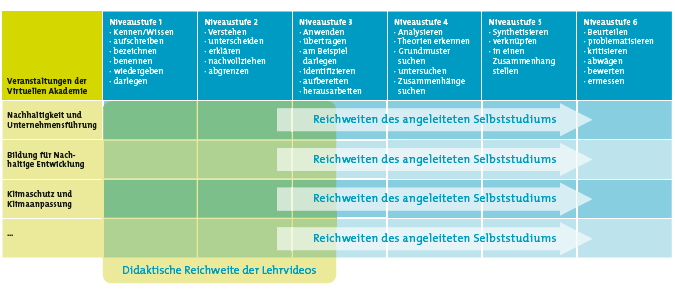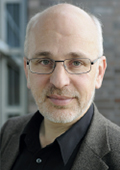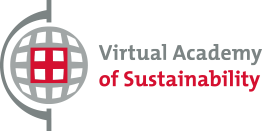Workload and Extent of the Courses
The extent of a course is designed to match the workload needed to receive 3 credit points. Based on the length of normal semester courses, each course is structured in 14–15 thematic units.
Learning Units and Episodes
These 14–15 thematic units are called learning units and contain 90 minutes of video material each, subdivided in 3 episodes à 30 minutes. Two of these episodes contain lectures with accompanying slides, the third one shows an interview with the lecturer to discuss further questions about the topics or show special examples. For the students, the interviews offer an opportunity to attend an interview as an observer and listener and deepen their own knowledge.

Media Didactic Concept
The core of the Virtual Academy of Sustainability is to offer ESD basics to students of all disciplines that they can acquire without prior knowledge. With distance-learning in form of learning videos the courses address the competences of knowledge and understanding. The learning objectives of the single episodes aim to enable students to designate, reproduce and present content as well as delineate, explain and differentiate. The suggestions for self-study also cover these competences. With the definition of the learning objectives at the beginning of each lecture seminar, the students are given a clear focus on their competency acquisition.
The Competence Orientation of the Virtual Academy
1. The Competence Orientation of the European Higher Education Area
In addition to providing a specialist qualification, there is more room for imparting interdisciplinary skills in bachelor and master programs. Since the students have quite different levels of interdisciplinary competences, which they have acquired at non-university learning areas, most universities offer a wide range of general studies and professionalization. The courses of the Virtual Academy are designed for these areas of learning. In the guided self-study of interdisciplinary courses, students can acquire important competences for sustainable development.
2. The Competence Orientation of the German Qualification Framework for Lifelong Learning
The bachelor and master levels 6 and 7 of the qualification framework (DQR) address above all the personal and specialist competences for complex problems. To secure that the teaching quality is on the level of bachelor and master education we work together with experienced instructors and lecturers from universities who have prepared their didactic content for the Virtual Academy. The Virtual Academy specifically addresses two competences of the qualification framework: online learning encourages self-reliance to define, reflect and evaluate learning and work processes, as well as to organize learning and work processes independently and sustainably. On the other hand, the students should acquire the skills to search for new solutions for the subjects of their own study area by means of the content offered at the courses. This is made possible because they receive relevant knowledge at the interfaces to other knowledge areas.
3. Transformational Competences for Sustainable Development
To create a more sustainable development means solving complex problems in all areas of life. Students of higher education institutions usually acquire this increased problem-solving capability in the chosen professional orientation of their studies. Complex sustainability problems require further competences like the competence to reflect guiding principles, the competence to deal with incomplete and over-complex information, the competence to handle individual decision dilemmas and the competence to act morally. The lectures organized by the Virtual Academy focus on these competences in order to shape a more sustainable development. (For more detailed information on transformational competences, please click here).

 “The offer of the Virtual Academy of Sustainability is great basic knowledge. It can be used or every Bachelor or Master program!”
“The offer of the Virtual Academy of Sustainability is great basic knowledge. It can be used or every Bachelor or Master program!”
Prof. Dr. Georg Müller-Christ
Professorship for Economics, especially for Sustainable Management, University of Bremen


